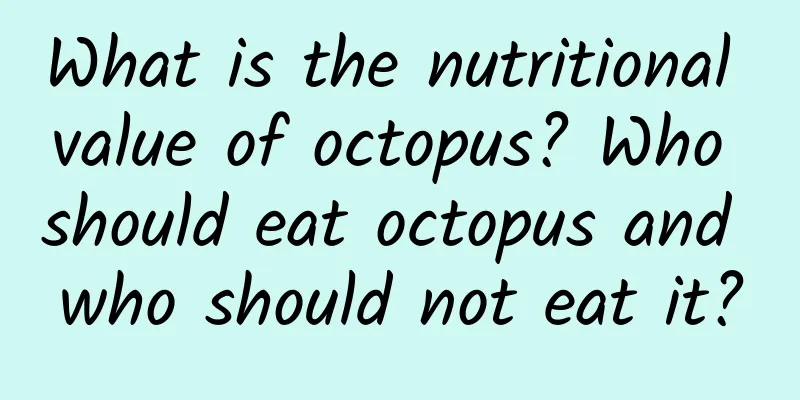What is the nutritional value of octopus? Who should eat octopus and who should not eat it?

|
Octopus has good nutritional value and is a high-protein, low-fat, cholesterol-free fish food. It often appears on our dining table and looks very appetizing. It is also a favorite of some friends. Next, let's take a closer look at the suitable and taboo groups for octopus. Contents of this article 1. What is the nutritional value of octopus? 2. People who are suitable for eating octopus and people who are not suitable for eating octopus 3. What should not be eaten with octopus? 1What is the nutritional value of octopus?The calorie content of octopus is 135 kcal (100 grams of edible part). It is rich in high-quality protein, a small amount of unsaturated fatty acids, and trace elements such as vitamin A, vitamin E, thioflavin, niacin, as well as nutrients such as calcium, phosphorus, selenium, magnesium, potassium, and sodium. It has good nutritional value and is a high-protein, low-fat, cholesterol-free fish food. 2Suitable and unsuitable people for eating octopus1. Suitable people: Since octopus can replenish blood and qi, and at the same time can lower blood pressure and enhance the body's immunity, it is suitable for people with weak constitution, high blood pressure, high blood lipids and those who have just recovered from a serious illness. 2. Contraindications: People who are allergic to seafood should not eat it. 3What can't be eaten with octopus?1. Foods rich in tannic acidOctopus is a kind of seafood, rich in protein and flavor amino acids, and tastes delicious. However, octopus should not be eaten with foods rich in tannic acid, such as persimmon, pomegranate, sour plum, mustard, plum, toon, hawthorn, and bitter greens, because the complex formed after the protein tannic acid reacts in the stomach is not easy to digest, which will reduce the nutritional value of the octopus. 2. Cold foodsOctopus is a food from the seabed, and it has a strong coldness. Eating it will increase the coldness in the body. Some people with weak spleen and stomach or who eat too much with other cold foods will have too much coldness in the body, and their intestines will be slippery, which will easily cause diarrhea and other physical discomfort. Therefore, it is recommended to eat it together. Common cold foods include: raw lotus root, crab, clams, clams, watermelon, persimmon, mung bean, kelp, bitter gourd, etc. |
<<: Why does the octopus shrink? Why is it so hard to chew the octopus?
>>: What are the benefits of eating octopus? How to tell if octopus has seeds?
Recommend
What causes vaginal bleeding to have a foul odor?
Vaginal bleeding in women is very common because ...
Canalys: Samsung's shipments reached 60.3 million units in Q1 2023, ranking first in the global smartphone market
According to recent news, Canalys announced the r...
What kind of lamps are generally suitable for bedrooms? How to choose bedroom lamps?
We all know that the bedroom is an important plac...
What are the best drugs for treating cervical erosion?
For women, cervical erosion is a very familiar fe...
What are the ultrasound manifestations of early endometrial cancer?
The uterus is very important for women. If a woma...
Can I still take Chinese medicine during menstruation?
The female body is still relatively fragile durin...
Cold symptoms during early pregnancy
The symptoms of a cold are quite obvious, such as...
How to eliminate external hemorrhoids in pregnant women
Pregnant women are the group most likely to devel...
How to relieve vulvar itching at night
Disease is a very common situation in people'...
Is laser spot removal good?
Laser freckle removal is very popular now. Many p...
I had sex 3 days after I took the IUD out.
Removing the IUD is a surgery that has a certain ...
How to regulate follicle development? Six ways to protect you
Preparing for pregnancy for men and women has now...
Breast cancer ulcer
Most breast cancers are malignant tumors derived ...
My period is three days late.
We all know that menstruation usually occurs in a...









